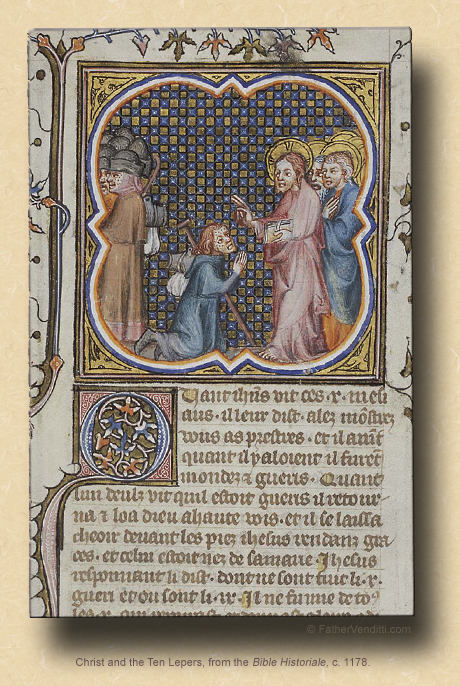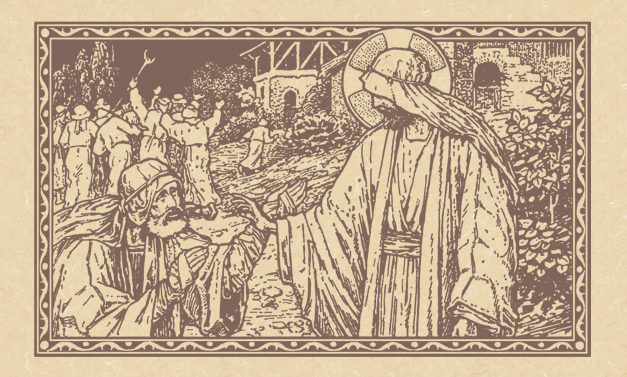The Virtue of Gratitude.
The Twenty-Eighth Sunday of Ordinary Time.
Lessons from the tertiary dominica, according to the ordinary form of the Roman Rite:
• II Kings 5: 14-17.
• Psalm 98: 1-4.
• II Timothy 2: 8-13.
• Luke 17: 11-19.
The Eighteenth Sunday after Pentecost.
Lessons from the dominica, according to the extraordinary form of the Roman Rite:
• I Corinthians 1: 4-8.
• Psalm 121: 1, 7.
• Matthew 9: 1-8.
FatherVenditti.com
|
 9:11 AM 10/13/2019 — Of course the Gospel today focuses on the virtue of gratitude. We’d probably all agree that gratitude is a rare enough quality when it comes to how we deal with one another; but, it’s just as rare, if not more so, in our dealings with God. And today we are presented that incident when our Lord encountered ten lepers and cured them all, but only one came back to give thanks. And our Lord even asked him, “Were not all ten made clean? And the other nine, where are they?” (Luke 17: 17 Knox). And I don’t wonder if that ratio isn’t accurate. We are grateful for maybe a tenth of what we should be grateful for. 9:11 AM 10/13/2019 — Of course the Gospel today focuses on the virtue of gratitude. We’d probably all agree that gratitude is a rare enough quality when it comes to how we deal with one another; but, it’s just as rare, if not more so, in our dealings with God. And today we are presented that incident when our Lord encountered ten lepers and cured them all, but only one came back to give thanks. And our Lord even asked him, “Were not all ten made clean? And the other nine, where are they?” (Luke 17: 17 Knox). And I don’t wonder if that ratio isn’t accurate. We are grateful for maybe a tenth of what we should be grateful for.
It’s easy to focus on what’s wrong with our lives, and everyone has something wrong. There’s not one of us who wouldn’t say that there isn’t something in his or her life that he wouldn’t want to change somehow. For some it may be something trivial; for others it may be something monumental, like a marriage that’s gone bad, or a child that’s in trouble, or a serious health problem. There’s always something negative that we can think about. And when there’s something wrong, it’s very difficult to put that aside and say, “Yeah, but look what’s right with my life. Look at how fortunate I am aside from this problem.” There’s always something to get depressed about if what you want is to be depressed.
It’s a matter of spiritual maturity. A spiritually mature person is one who can receive the crosses given to him in life, not necessarily without hardship, not without difficulty or suffering, not even without complaining sometimes, but without any effect on the strength of his faith. It is said that the first sign of maturity in a child is when he first realizes that mom and dad know better, not because he’s seen the reason of his parents’ position, but because he understands that they are more experienced than he, and therefore understand things that he can’t yet. And that same thing is true in our relationship with God: we can say we are spiritually mature when we can realize that God’s ways are not our ways; and that it isn’t necessary to understand why this or that has happened, except to understand that God has a handle on it even if we don’t. It takes a lot of humility to reach that point in life, but humility is also a function of maturity.
In a little more than a month—believe it or not—our nation will observe that annual day of prayer—at least originally it was supposed to be a day of prayer—which we call Thanksgiving Day, and right after that begins the penitential season of Advent; so, here’s a question you can add to your examination of conscience for both occasions: am I grateful for everything I have received, or do I choose, instead, to brood about what I think has been denied to me?
Some of you have heard me say it at daily Mass, and as long as I have breath in me I’ll never stop reminding you that the goal of the Christian life is to serve our Lord in this life so as to be happy with Him in the next; that living the Commandments is not something we do to attain happiness in the here and now, but something we owe to God because He is God; that the short time we spend on this piece of floating space debris we call this world is but a drop in the ocean of eternal life; and, that so long as we live in this world, we are only on a journey, and that the best part of any journey is arriving home.

|

